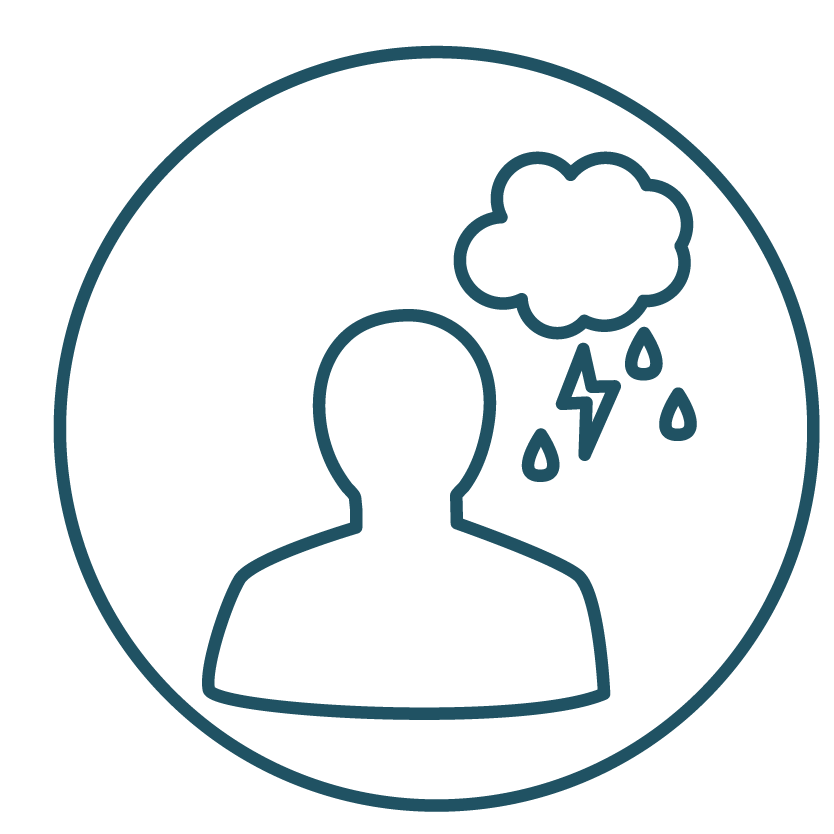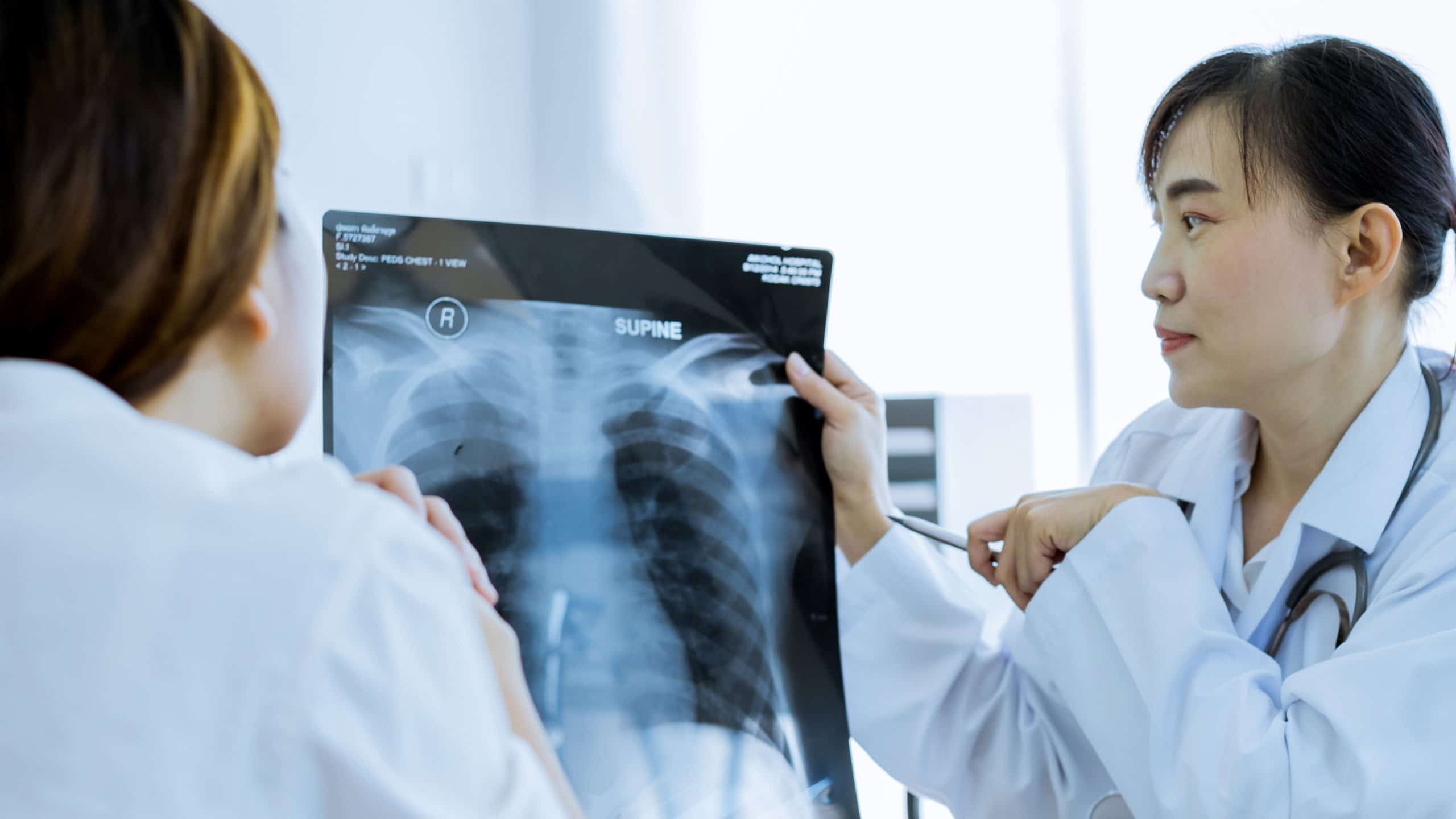The Effect of Lung Cancer on Mental Health
Being diagnosed and treated for lung cancer can have substantial effects on the patient’s mental health. Learn what this looks like and how this can affect you and your family.

How Does Lung Cancer Affect My Mental Health?
Lung Cancer and mental health share a profound connection, although a bit of a negative one. When you’re diagnosed with lung cancer, it’s not just your body fighting for survival but also your mind. An unexpected or expected diagnosis can have a significant impact on your mental health and the well-being of those close to you, such as family, caregivers, and friends. Understanding these emotional changes is key to navigating a lung cancer diagnosis and seeing how exactly it affects you and your support system.
Being aware of the signs and symptoms of emotional turmoil is important if you want to have a positive outlook on your journey. It enables you to take swift action and ensure that you or your loved ones receive the necessary support and treatment to effectively address mental health effects such as depression, distress, and anxiety. We hope these coping tips and information empower you to take care of yourself or help someone suffering from a lung cancer diagnosis.
How to Cope with Distress as a Lung Cancer Patient
Distress is a multi-faceted term encompassing a wide range of unpleasant emotions, thoughts, and behaviors. Research has revealed its detrimental impact on decision-making and a patient’s capacity to manage their health effectively. Some distress is to be expected during uncertain and intimidating times, as the uncertainty of the outcome of a lung cancer diagnosis can be stressful. This can cause issues and disruptions in focus, sleep, and eating patterns, possibly affecting lung cancer treatment due to diminishing health. Patients often describe distress as
- Anger
- Helpless and/or hopeless
- Loss of control
- Panicked or anxious
- Questioning faith, purpose, or meaning in life
- Sad
- Scared
- Secluded
If distress starts to play a larger negative role and starts complicating your quality of life, seeking professional help may be a good option.

Signs of Anxiety During Lung Cancer Treatment
Anxiety, in this specific context, revolves around feelings of worry and fear regarding potential situations and outcomes revolving around a lung cancer diagnosis. Lung cancer patients may experience anxiety related to their treatment and recovery, while their family members and caregivers may share similar concerns about their loved ones’ life expectancy. Feelings of apprehension and fear can extend to doctor visits and medical tests as well, especially when it comes to the cost of treatment.
In recognizing the signs of anxiety, you can take important steps toward prevention, as these symptoms are sometimes misinterpreted. Anxiety signs and symptoms look like:
- Anxious facial expressions
- Dry mouth
- Issues problem solving and staying focused
- Muscle tension
- Outbursts of anger
- Restlessness or shaking

Signs of Lung Cancer Depression
When a person experiences depression, their feelings may manifest as an intense fluctuation between sadness and grief. Even thinking about the cause of a lung cancer diagnosis can trigger negative thoughts. A person experiencing depression may struggle with diminished hope, doubt their future aspirations, encounter difficulties in carrying out daily routines, and withdraw from social interactions and activities altogether.
It’s essential to understand that mild depression is a common response to a serious illness, either for the patient or their loved ones. However, when depression worsens, individuals start to display severe symptoms and heightened emotions. Key symptoms that your loved one with lung cancer may be dealing with depression include:
- Continued loss of interest in previously enjoyed activities.
- Excessive (and unplanned) weight loss
- Feelings of guilt and worthlessness
- Issues sleeping (oversleep or can’t fall or stay asleep) or continued fatigue
- Mood swings from extreme sadness to agitation, to high energy and more
- Ongoing sadness, hopelessness, or feelings of emptiness that occur most of the day, every day
- Problems staying focused, making decisions, or remembering things
- Thoughts of suicide or death or attempts
Certain effects of depression, like fatigue, poor appetite, and sleep irregularities, can also be side effects of certain lung cancer treatments. These symptoms may also linger post-treatment, so it’s important to identify triggers and talk to someone close to you. Your cancer care team will be able to evaluate these symptoms better and inform you.
Mental Health Effects on Lung Cancer Caregivers
Studies have shown that caregivers suffer from more stress, depression, lower life satisfaction, and poorer physical health when compared to non-caregivers. Family members and friends of the patient can also experience this, as these individuals care deeply but can feel helpless in the situation. This condition is also known as caregiver and compassion fatigue and can encompass problems focusing, decision-making, sleeping, and eating. This can also lead to burnout, negatively impacting employment, income, and other day-to-day situations if coping mechanisms aren’t developed.
If a caregiver is under too much stress and needs a break, they can seek the help of a hospice team. The hospice workers can provide the caregiver with a temporary leave while they take care of the lung cancer patient.
Lung Cancer Mental Health Tips and Coping Strategies
Coping with the emotional toll of lung cancer requires comprehensive support. The lung cancer care team can provide medication to manage anxiety and depression, ensuring patients receive appropriate treatment for their mental health. Exploring complementary treatments such as yoga, meditation, or massage may also offer benefits for both patients and their caregivers. Remember, you don’t have to face the challenges of lung cancer in isolation; there are resources and support available to help you navigate this difficult journey.
- Prioritize self-care: Dedicate time to activities you enjoy to alleviate stress and anxiety.
- Stay informed: Educate yourself about lung cancer, treatment options, and the emotional challenges it entails.
- Routine maintenance: Aim for regular mealtimes and adequate sleep to ensure physical and mental well-being.
- Seek support: Reach out to professional support groups or confide in someone you trust to share your feelings and concerns.
- Take breaks: Set aside personal time for relaxation and rejuvenation.
- Set realistic goals: Recognize your limits and be open to seeking assistance when needed.
- Utilize respite care: Consider respite care services to prevent caregiver burnout and compassion fatigue.
To cope with the emotional challenges that come with a lung cancer diagnosis, it’s crucial to prioritize mental well-being. Seeking support and taking action are essential. Whether you’re a patient, caregiver, or loved one, we’re here to guide you through this journey. Reach out to our mental health advocates for assistance and resources, and let’s navigate this path together. If you have questions or need help, please don’t hesitate to contact us through our dedicated contact page. Your mental health is our priority, and we’re here to support you at every step.


